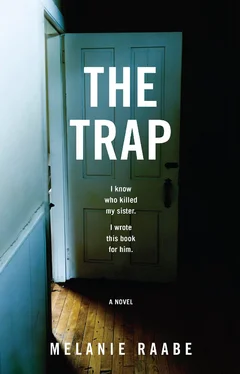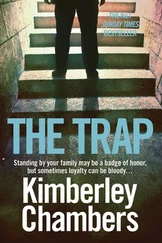I am prepared. I spent half an hour on the treadmill when I got up this morning — long enough to flood my brain with oxygen but not so long as to wear myself out. I had a shower. I dressed with care. I’m wearing black. Not blue, which conveys trust, or red, which emanates aggression and passion, or white, which stands for innocence, but black. Black means seriousness, gravity — and, yes, mourning.
I’ve had a good breakfast. There was salmon and spinach: pure brain food, according to a nutritional expert I once spoke to. After breakfast, I fed Bukowski and put him in one of the upstairs bedrooms with a bowl of water, something to eat for later and some of his favorite toys.
Now here I am on the sofa.
I think back to the telephone call I made some weeks ago to an expert from the regional criminal investigation department, and recall Professor Kerner’s cheerful manner, which stood in such stark contrast to the topic of our conversation.
I had decided to ask him for his discretion, and then to lay all my cards on the table and tell him everything. I told him about my sister Anna. I told him about the unsolved murder case. And I wound up by asking him my most important question: whether the traces of DNA that were gathered at the scene of the crime all those years ago had been kept.
“But of course!” he replied.
I am glad I talked to Kerner. Because, of course, if there’s one thing I want more than anything else, it’s for my sister’s murderer to break down in front of me. I have to find out what happened on that goddamn night, and I have to hear it from his own mouth. The thought of Kerner and his DNA samples reassures me. He is my safety net. I’m going to get Lenzen. One way or another.
I glance at the clock. It’s a little after eleven. I still have almost an hour to relax and go over everything in my head one last—
There’s a ring at the door. I start up in alarm. Adrenaline fills my belly and rushes to my head like a surge of cold water. My composure has vanished. I steady myself on the arm of the sofa, take three deep breaths, and then head for the door. Maybe the postman. Or a traveling salesman — do such people still exist?
I open the door.
For years, the monster has pursued me even in my dreams. Now he’s standing before me.
“Good morning,” says Victor Lenzen with an apologetic smile, and holds out his hand to me. “I’m Victor Lenzen. We’re a bit early. We left Munich in good time to make sure we weren’t late, but the traffic was much better than we expected.” I suppress the impulse to run away screaming. I feel caught out, but I don’t show it.
“No trouble at all,” I say. “I’m Linda Conrads.”
I shake his hand. I smile. The way out of fear leads through fear.
“Please come in.”
I do not hesitate. I do not tremble. I look him in the eye and my voice sounds strong and clear. It is only now that my tunnel vision opens out a little and I notice the photographer. He is young (mid-twenties, at most), and when I give him my hand he looks a bit nervous — nervous, but keen. He says something about being a fan of mine, but I have trouble focusing on him.
I let the two men into my house. They both wipe their feet politely. Lenzen is wearing a dark coat, which he takes off to reveal immaculate clothes: dark trousers, a white shirt, a black jacket, no tie. He is graying stylishly, and has just the right kind of wrinkles.
I take his coat and the photographer’s parka and hang them on the hooks in the hall, casting stolen glances at the two men as I do so. Victor Lenzen is one of those people whose charisma cannot be reproduced on a photo, whose presence transforms the atmosphere of a room. Lenzen is surprisingly attractive, in an unusual and dangerous way.
I’m annoyed at my flitting thoughts, and try to concentrate. The men seem apprehensive in the large, elegant hallway of the house of this egocentric novelist who never sets foot outside. They feel like intruders. That’s good; uneasiness is good. I lead the way to the dining room, taking the moment to collect myself. Here goes. Their early arrival was, of course, intentional on Lenzen’s part, calculated to put me off my stride and allow him to take the helm, to dictate the course of action, to show me right from the start that I was not in control of the situation. It did, it is true, throw me briefly, but I have recovered my composure. I am surprised at how little I actually feel, now that everything’s under way. I’m in a kind of daze; I feel like an actor when the curtain goes up, an actor who’s playing the part of Linda Conrads. All this is a kind of act, really — a show put on for the cameras and microphones in my house, to which Lenzen and I are performing.
My decision to conduct the interview in the dining room was not a strategic one; it was purely intuitive. The living room seemed wrong to me. We’d have had to sit on the sofa, close up to one another — the soft, comfy sofa; it wouldn’t have been right. My study is up the stairs, along the corridor, at the end of the passage; it’s too far away. The dining room, on the other hand, is ideal. It is close to the front door; it has a large table that creates a certain distance. And it has one further advantage: apart from the times I stand here looking out the window, contemplating the edge of the woods, I hardly ever use it. When I’m alone, I eat in the kitchen. I’m alone a lot. I’d rather sit face-to-face with Lenzen in a room that doesn’t mean as much to me as, for instance, the kitchen, where I’m used to chatting to Norbert while we drink rosé and I stir the saucepans. Or the library upstairs, where I travel and dream and love. Where I live.
I try to appear relaxed and not to stare at Lenzen. Out of the corner of my eye I can see him taking in the room in a few sweeping glances. He walks across to the dining table. He puts his bag down on the first chair he comes to, opens it up and glances inside. He’s making sure he has everything with him.
He seems a tad awkward, almost nervous, but then so does the photographer. If I didn’t know any better, I would presume they were simply intent on making a good job of the interview, and put their jumpiness down to that. As far as the photographer is concerned, this may well be the case.
I glance at the large, empty dining table where I’ve laid out the copies of my new novel. It was not, of course, necessary to display the book; I am sure that everybody here is acquainted with the contents. But from a psychological point of view, it can’t be a bad idea to have the indictment to hand. The photographer will think the books are supposed to feature in the pictures. He’s fiddling about with his equipment while the monster takes a look around the room.
I sit down, take a water bottle, open it, pour myself a glass. My hands do not tremble. My hands — I ask myself whether it’s the first time I’ve shaken hands with a murderer. After all, you never know. I ask myself how many people I’ve shaken hands with altogether in my life and how long I’ve been alive. I do a quick sum in my head. Thirty-eight years: that’s about 13,870 days. If I’d shaken hands with one person every day of my life, that would make almost fourteen thousand people. I wonder how many had committed murder, and arrive at the conclusion that this is probably not the first murderer I’ve shaken hands with — just the only one I know about.
Lenzen glances at me. I force my thoughts to settle down; they’re flapping about like startled chickens, but eventually do as I tell them. I’m annoyed. And I’m annoyed that I’m annoyed. This is precisely the kind of carelessness that could prove fatal. I must concentrate from now on — that much I owe Anna.
I look at the monster. I look at Victor Lenzen. I hate his name. Not only because it’s the monster’s name, but also because I know that Victor means “conqueror” and I believe in the magic of names. But this time the story is going to end differently.
Читать дальше












